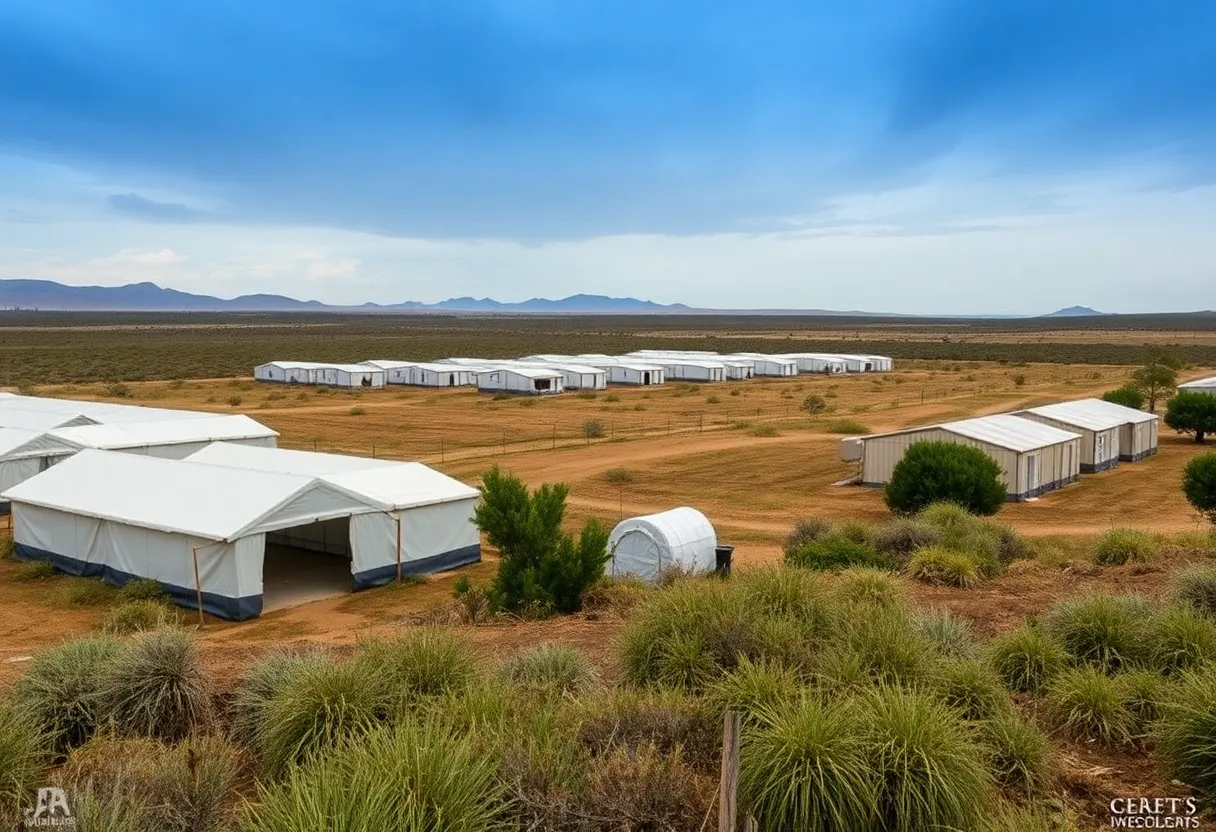News Summary
The Archdiocese of Miami has spoken out against a migrant detention facility dubbed ‘Alligator Alcatraz,’ citing concerns over inhumane conditions and a lack of transparency. With reports of poor living conditions and state officials denying access to lawmakers, the facility’s existence raises ethical questions. Critics highlight the facility’s environmental impact and overcrowding issues in ICE custody. As discussions unfold, calls for improved treatment of migrants are growing.
Archdiocese of Miami Takes a Stand Against Controversial Migrant Detention Facility
The Archdiocese of Miami has recently expressed strong disapproval of a **bizarrely dubbed** migrant detention facility known as “**Alligator Alcatraz**.” With conditions and treatment at the facility coming under increasing scrutiny, the archbishop has pointed out that such a facility is **“unbecoming of public officials”** and possibly damaging to the greater community’s well-being. Sounds like **a tough situation** for all involved!
The Not-So-Cuddly Facility
Instead of being a welcoming space, this facility is rather isolated, raising significant humanitarian concerns. It’s located in the **Everglades**, having been repurposed from an airport runway to accommodate as many as **3,000 migrants**. The **temporary tent structures** where detainees are housed are said to be vulnerable to severe weather conditions, particularly during hurricane threats. The criticism has rolled in, especially regarding claims about the **alligator and python** rhetoric used to emphasize deterrence. It seems that **fear mongering** isn’t going over well here.
Access Denied
Adding to the grievances, a group of **Democratic state lawmakers** has filed a lawsuit against state officials for **shutting them out** from accessing the facility. The lawmakers are calling for **“immediate, unannounced access”** to assess the situation themselves. State Senator Shevrin Jones voiced a growing call for transparency, especially as **allegations of inhumane conditions** start to surface.
Life Inside the Facility
Reports from detained individuals and their families point towards grim living conditions. Complaints have included limited access to showers, spoiled food, sweltering heat, and pest issues like mosquito infestations. Yet, the state has **denied** these allegations, which adds another layer to this complicated situation. When lawmakers were offered a **scheduled tour** of the facility, they considered it inadequate, arguing that mere pre-arranged access does not suffice for transparency.
Defending the Facility’s Existence
Some public figures like House Speaker Danny Perez have come forward to defend the facility, stating that it is necessary for housing those who have committed crimes, downplaying the claims that it resembles a **“five-star resort.”** Meanwhile, **Miami-Dade Mayor Daniella Levine Cava** has echoed the demand for access, pointing out that the facility sits on county land and is still **awaiting a response** to her request.
A Unique Location
With the facility’s construction progressing rapidly, plans are underway to expand its capacity up to **5,000 beds.** Florida Governor Ron DeSantis has described it as a **“low-cost”** alternative, emphasizing its strategic location amidst the natural safeguards of alligators. The facility is touted to be **“completely self-contained”**, utilizing what could be described as somewhat makeshift resources, such as **repurposed FEMA trailers** and temporary soft-sided buildings. It will rely on mobile utilities for water, sewage, and power—so think of it as a **giant camping site**, just not the kind that most people would find comfortable!
Environmental and Ethical Concerns
There’s more than meets the eye, with numerous **environmental and Indigenous groups** raising alarms regarding the facility’s impact on sacred lands and local ecosystems. Activists, including representatives from the **Miccosukee Tribe**, express concern over its proximity to vital freshwater resources and its potential role during the hurricane season. Given the facility’s hefty **$450 million** operational cost for just one year, ethical concerns about how migrants are treated and housed seem justified.
Overcrowding Crisis
With more than **58,000 immigrants currently in ICE custody**, local jails are experiencing overcrowding, pushing the pressure for alternative detention solutions back into the spotlight. Critics continue to draw comparisons to other detention facilities known for allegedly inhumane conditions, reinforcing calls for better treatment of detainees.
In Conclusion
The **Alligator Alcatraz** facility continues to stir up controversy and debate as discussions about transparency, humanitarian concerns, and ethical treatment unfold. As different stakeholders weigh in, it remains to be seen how this story will develop. Stay tuned, because this definitely isn’t over yet!
Deeper Dive: News & Info About This Topic
- NBC News
- CNN
- AP News
- The New York Times
- BBC News
- Wikipedia: Immigration Detention in the United States
- Google Search: Alligator Alcatraz
- Encyclopedia Britannica: Immigration
- Google News: Alligator Alcatraz

Author: STAFF HERE PETERSBURG WRITER
The ST PETERSBURG STAFF WRITER represents the experienced team at HEREStPetersburg.com, your go-to source for actionable local news and information in St Petersburg, Pinellas County, and beyond. Specializing in "news you can use," we cover essential topics like product reviews for personal and business needs, local business directories, politics, real estate trends, neighborhood insights, and state news affecting the area—with deep expertise drawn from years of dedicated reporting and strong community input, including local press releases and business updates. We deliver top reporting on high-value events such as Grand Prix of St. Petersburg, Localtopia, and SHINE Mural Festival. Our coverage extends to key organizations like the St. Petersburg Area Chamber of Commerce and St. Pete Downtown Partnership, plus leading businesses in finance, manufacturing, and healthcare that power the local economy such as Raymond James Financial, Jabil, and Bayfront Health St. Petersburg. As part of the broader HERE network, including HEREJacksonville.com, HEREOrlando.com, HERETallahassee.com, and HERETampa.com, we provide comprehensive, credible insights into Florida's dynamic landscape.





